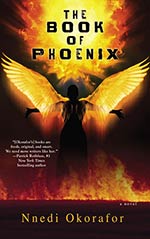
![]() Grayman14
Grayman14
5/25/2016
![]()
"Human beings make terrible gods." (p.162)
Every now and then, a story comes along that just seems to push all the right buttons at the right time. Nnedi Okorafor's The Book of Phoenix is that book. In my opinion it's a fantastic story that deserves to be read by as many people as possible. I've been waiting to read a book this good since I started my blog.
*Spoiler Warning: Providing a synopsis of this book is difficult without revealing some of the plot. Read on at your own risk.*
The book opens with a frame narrative that reminded me of the first part of A Canticle for Leibowitz. Years after a great catastrophe, an old man finds "a cave full of computers" in the desert. Within these dated artifacts lies an audio file which contains an extract of The Book of Phoenix, narrated by a woman with a "soft breathy voice [...] like a powerful incantation." (p.5)
"To tell my tale, I will use the old African tools of story: Spoken words. They are worthier of my trust and they'll last longer." (p.5)
Phoenix is an "accelerated woman", a kind of X-toddler who, despite being only 2 years old, has the physical appearance of a mature woman. She is being raised in an experimental research & development building called "Tower Seven", slap bang in the middle of a near-future New York City. The Tower is controlled by a shady NWO-type agency who is conducting genetic mutations and experiments on the Tower's secured inhabitants.
Okorafor has created a powerful, emotional character who we quickly begin to root for as she takes her first rebellious steps on what becomes a fascinating journey to Africa and back. At times, Phoenix burns with a righteous rage that brings to mind the fiery temper tantrums of young children. This detail helps to remind the reader of how young Phoenix is, despite her size and strength. She also loves books!
"I adore everything about them. I love the feel of the pages on my fingertips. They are light enough to carry, yet so heavy with worlds and ideas." (p. 135)
It would be easy to label this as "just another superhero story" but there is so much that Okorafor covers in the 241 pages. She addresses issues and themes that include genetic engineering, supernormal abilities, racial stereotypes and racism, colonialism, identity, revenge, love, and sacrifice. There is also a strong environmental theme running through the story, a presage of things to come, which the author has already written about in Who Fears Death, the previously-published "sequel" to Phoenix.
Thanks to this stunning book, I am now a big fan of Nnedi Okorafor and am eager to read all of her stories. I have read great things about her novel Lagoon and her award-winning novella Binti. I really want to read the World Fantasy Award winning Who Fears Death to continue experiencing the universe created in this flammable book.
Very highly recommended!